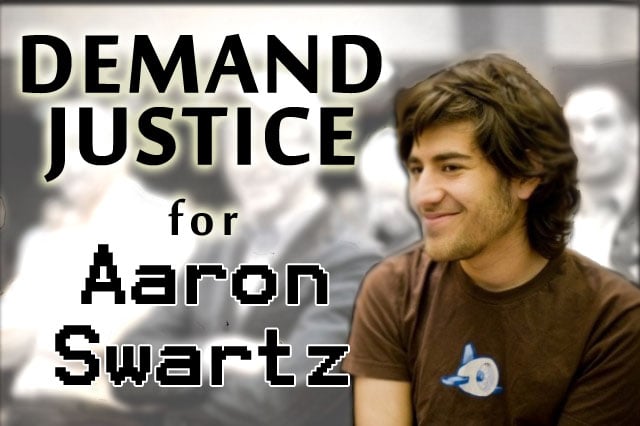To mark Internet Freedom Day, digital rights groups are calling for reforms to computer crime laws, after the death of activist Aaron Swartz.
The death of Internet freedom activist Aaron Swartz this month “has resulted in an unprecedented outpouring of grief, along with a strong commitment to use this tragedy to make some of the change Aaron wanted to see in the world,” says the Electronic Frontier Foundation (EFF). Efforts are being coordinated by digital rights groups in the United States to reform the laws that were used to prosecute Swartz for downloading too much material – even though his actions never caused any harm. The proposed law has been named “Aaron’s Law” in memory of Swartz, the founder of Demand Progress, who took his own life earlier this month.
Sign the Petition
You can sign a petition started by Demand Progress and show your support for Aaron’s Law, and lobby to “amend the Computer Fraud and Abuse Act to make sure nobody’s prosecuted for victimless alleged crimes.” The petition also calls for support for a Congressional inquiry into the prosecution of Swartz, which Demand Progress calls “abusive.” A US Congressman is already looking into launching an investigation, so add your voice to the call.
Join the Conversation
On 18 January 2012, as part of what became the largest online protest in the history of the Internet, a number of IFEX members pulled the plug on their websites in protest against two online piracy bills before the U.S. Congress, the Stop Online Piracy Act (SOPA) and the Protect Intellectual Property Act (PIPA).
One year later, on Internet Freedom Day, 18 January 2013, EFF and other digital rights groups celebrated the important victory over SOPA and PIPA and remembered the life of Swartz, who contributed so much to the fight for digital rights. EFF began an open conversation (still going on) to “attack the computer crime laws that were so horribly misused in the prosecution of Aaron,” the Computer Fraud and Abuse Act (CFAA) and Wiretap Act. EFF says, “In the spirit of Aaron’s commitment to transparency, this process should be as open as possible and so we’re showing our work earlier than we otherwise would.” Please join the conversation and let EFF know what you think of their suggested updates to the laws and if you have proposals or changes to the language.
For more background, see: EFF’s Initial Improvements to Aaron’s Law for Computer Crime Reform
Background on Internet Freedom Day




